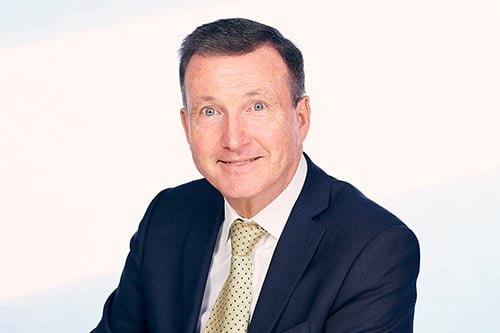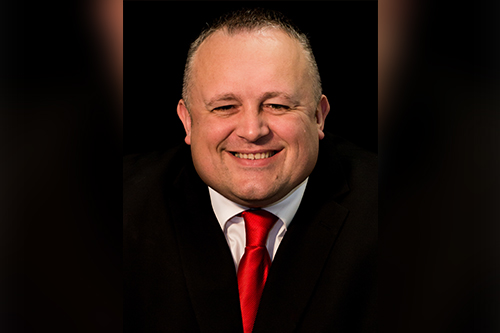

How can insurance businesses make the most of the current remote working environment and boost their leads and their web presence? This was a question posed to the panel at the opening keynote speech on ‘Growing your business’ at the recent Insurance Connect event, and the insurance professionals assembled outlined how businesses can take control in this uncertain economic landscape and create an enhanced value proposition.
Keith Richards (pictured above), MD of engagement at the Chartered Insurance Institute (CII) and CEO of the Personal Finance Society, highlighted the value of data analytics tools in helping brokers to understand who, why and when potential clients are searching for their services. This data can then inform their future sales and marketing strategies, he said, and so there are some real opportunities, particularly for smaller brokers, to change the way they are working.
“I think one of the things that we’ve certainly seen as a result of the pandemic, and it surprised many people, is just how well their businesses and, more importantly, their people have responded to the challenges of working remotely and working from home,” he said. “It’s certainly driving a lot more traffic, which means that we need to be a lot more tech-savvy, going forward, to attract and engage our clients.”
From a sales point of view, said Andy Preston (pictured below), a sales motivational speaker at Andy Preston Ltd, the pandemic has simply kicked everybody 10 years into the future before they were ready. Evaluating his financial services clients, and his insurance clients, in particular, he noted that a lot of insurance brokers have become complacent and lazy. They are focused on compliance and product training and many haven’t upskilled the sales side of their business or anybody involved with dealing with customers and prospects in the last 10 years.

“Not only was it a big shock to people having to shift to digital anyway,” he said, “but we should have been doing this five to 10 years ago. As a sector and an industry, we haven’t progressed as fast as other sectors so we’re a little bit behind the ball. This is a much bigger shock for insurance which should have [already] been playing this game and now is having to do it because it’s being forced to do it. And I always say that if you don’t change or develop, the market will change and develop on you.”
In the same way that brokers who don’t embrace digital selling tools are missing out on substantial amounts of business, now brokers who are not mastering digital communication tools such as Zoom and Teams or other platforms must question how much business they are losing. Many brokers have relied on an existing client base for far too long, Preston said, but this is the market for these brokers to go out and win new business.
“Your biggest competitor will be prospecting your best account,” he said. “Are you prepared for that, and to go and win business in return? Most insurance brokers frankly, aren’t.”
How smaller brokers without substantive marketing budgets at their disposal can do this is by accepting that, when pitching to prospects, it’s not always about being the best broker or having the best product selection or the best service. Sometimes, Preston said, when all these factors are similar between different insurance brokers, it becomes about who gives the best presentation and who comes across the strongest. In an online world, this is a question of who is the best presenter over a digital channel and the current remote climate gives brokers a real opportunity to walk their prospects through a proposal step-by-step.
“Now it’s about how digitally savvy you are, and whether you are a standout salesperson rather than a standard salesperson,” he said. “It’s about creating a really compelling LinkedIn profile so that when people check out your credibility, you pass what I call the buyers’ credibility test. And particularly if you’re trying to win business off another broker then you need to be sharper and better and really impressive. How good a digital presence have you got? Can you find evidence that what you’re telling me is really credible? Prove it, let me see that online. When I do my research on you and your organisation what turns up? How good are you at presenting over Teams? How convincing and persuasive are you?”
An active and positive social media presence can also help build awareness for both brand and services, Richards noted, and Twitter and LinkedIn are both good examples of offering cost-effective solutions to targeted audiences with advertising. In this way, smaller or more specialist brokers can make sure that their messages are received by the right people in the communities that they serve.
What has been especially fascinating, Richards said, is the equalisation of the intergenerational technology gap which the pandemic has precipitated. Older people are now using the same technology as their grandchildren, and getting quite comfortable with it. So one of the real big game changers is how this situation has helped to neutralise what was seen as a technology gap between the younger generation and the older generation.
“[Brokers] must focus on digital sales skills and on the gap between where they are and where they could be,” Preston said. “And if you are really good, how much business could you take from the competition? I would say that the market is really open to good selling, good presenting and a really good digital presence. You can absolutely clean up right now because most of your competitors are way behind, so gain the advantage while you can.”
